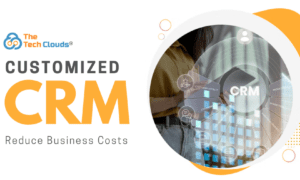In the wake of the COVID-19 pandemic, the landscape of Customer Relationship Management (CRM) has undergone a profound transformation, catalyzing a shift towards more dynamic and empathetic approaches. As an industry expert I have had the opportunity to closely monitor these trends, observing how organizations have adapted to meet the evolving needs and expectations of their customers.
One notable trend that has emerged is the heightened emphasis on digitalization and remote capabilities within CRM systems. With remote work becoming the norm for many businesses, there’s been a surge in demand for cloud-based CRM solutions that facilitate seamless collaboration and accessibility from any location. This has led to the proliferation of AI-powered chatbots and virtual assistants, which play a crucial role in delivering personalized customer experiences and streamlining communication channels.
Artificial intelligence in CRM, per automation integration, is pivotal. This empowers organizations to automate seemingly mundane tasks, extract actionable insights and analyze datasets. This can be achieved with AI-driven chatbots, predictive analytics and CRM systems that foster personalized interactions with customers.
The pandemic has underscored the importance of data-driven decision-making in CRM strategies. As businesses navigate uncertain economic conditions and shifting consumer behaviors, harnessing the power of data analytics has become paramount. Advanced analytics tools integrated into CRM platforms enable organizations to gain deeper insights into customer preferences, anticipate trends, and tailor their marketing efforts accordingly. Additionally, predictive analytics have proven invaluable in forecasting customer behavior and identifying potential churn risks, empowering businesses to proactively address issues before they escalate.
Another key trend in the post-pandemic era is the heightened focus on customer empathy and engagement. As individuals grapple with the effects of the pandemic on their personal and professional lives, there’s a growing demand for authentic connections and meaningful interactions with brands. Successful CRM strategies now place a greater emphasis on empathy, understanding, and relationship-building, rather than purely transactional exchanges. This involves leveraging CRM platforms to personalize interactions, anticipate customer needs and demonstrate genuine concern for their well-being, but also that of a company’s employees.
In an era where remote work is king, collaborative CRM platforms provide seamless collaboration among the sales, marketing and customer service teams. The employee experience is just as important as that of the customer. Acknowledging the significance of employee satisfaction and providing a positive EX will assist in reducing turnover rates but also in enhancing customer engagement and retention.
Integration of social CRM capabilities has become increasingly important in the post-pandemic landscape. With social media platforms serving as vital communication channels, businesses must actively monitor and engage with customers across various social channels. By integrating social CRM functionalities into their systems, organizations can effectively track brand mentions, engage in real-time conversations, and leverage user-generated content to enhance brand visibility and credibility.
Optimizing CRM investments for businesses is crucial. Businesses are doing this through integrating CRM platforms with other core systems, like ERP, e-commerce and automated marketing. This process, while seamless, also offers a unified view of organizational customer interactions and eliminating data silos.
Implementing a new ERP system presents inherent risks. Discover how to mitigate the likelihood of failure and enhance the prospects for success by adhering to these established best practices:
- Establish Goals. A fundamental tenet in ERP implementation best practices lies in the delineation of business goals. Regrettably, numerous companies fall into the trap of selecting off-the-shelf software in anticipation of gaining insights into optimizing their business operations. This approach often undermines the inherent strengths of a business. To circumvent this pitfall, it’s imperative to initiate the process by elucidating desired key performance indicators (KPIs) and undertaking strategic planning endeavors aimed at aligning the implementation effort with the core functions of the company.
- Focus on Quality Data. The ERP implementation phase serves as an optimal juncture to streamline the organization’s data management processes. Conversely, neglecting data quality can spell doom for the project. The significance of addressing this issue has escalated in the era of cloud ERP and AI-driven analytics, where data integration from various sources is commonplace. I advise prioritizing foundational tasks before embarking on data migration endeavors. This entails establishing uniform data definitions and formats while ensuring standardized data practices across systems and organizational spheres. Additionally, I would like to underscore the importance of collaborating with a master data management provider equipped with robust tools and methodologies to facilitate seamless data governance.
- Plan Your Implementation. The success of an ERP rollout hinges significantly on the chosen implementation methodologies. A successful ERP deployment necessitates the meticulous documentation of business requirements. I’d like to emphasize the importance of sandboxing—an approach involving the testing of new software within a separate, isolated environment. This practice is an indispensable component of sound implementation methodology and is vital to ensuring the ultimate success of deployment.
- Communicate and Embrace Change (and Failure). In any comprehensive ERP implementation best practices guide, communication assumes a paramount role. It holds particular significance due to the expansive nature of ERP deployments, which permeate every facet of an organization. Contrary to common misconception, an ERP rollout transcends being merely an IT project—it embodies a holistic endeavor that implicates the entire company. Highlighting communication as a pivotal element of organizational change management, I believe this to be critical. Employees must be thoroughly informed about how the software will impact their roles and subsequently be trained on the new tools. This proactive approach significantly influences the level of user adoption and ultimately determines the effectiveness of the new system implementation.
The times have ushered in a new era of CRM characterized by digitalization, data-driven insights, customer empathy and social engagement. As businesses continue to adapt to the evolving landscape, embracing these trends will be essential for staying competitive and fostering long-term customer relationships.
The post-pandemic era has certainly accelerated the adoption of CRM technologies. Organizations that embrace these trends and invest in modern CRM solutions will be well-positioned to thrive in the digital-first economy.
About Arun Gupta
Arun Gupta is a Microsoft Dynamics 365 Architect and a CRM Consultant with over a decade of industry expertise. He holds a Master of Science in Information Technology from the University of North Carolina (Charlotte) and a Bachelors of Technology from Guru Gobind Singh Indraprastha University (New Delhi). He is a member of ISACA, committed to the business advancement of digital trust, and of IEEE, the world’s largest technical professional organization dedicated to advancing technology for the benefit of humanity. For more information on Arun Gupta visit https://www.linkedin.com/in/arungupta86/
Read More From Techbullion



































